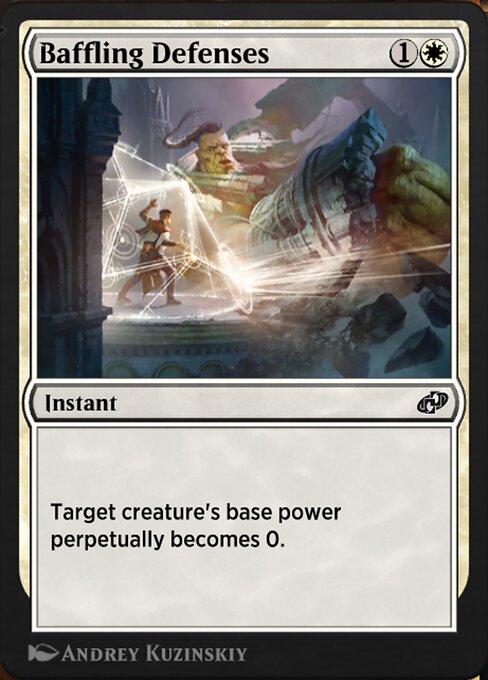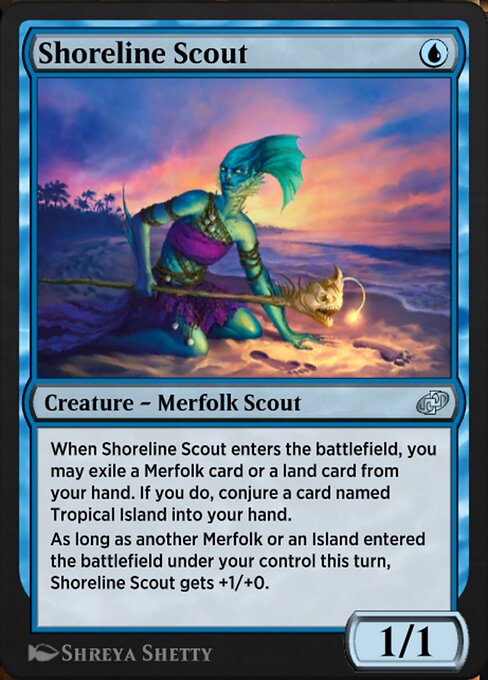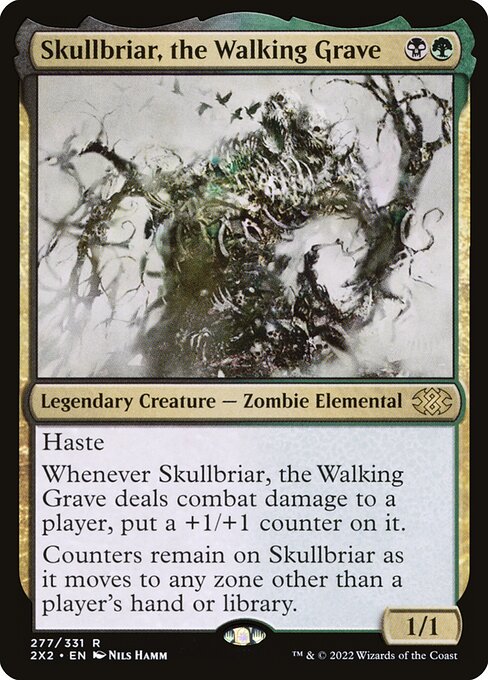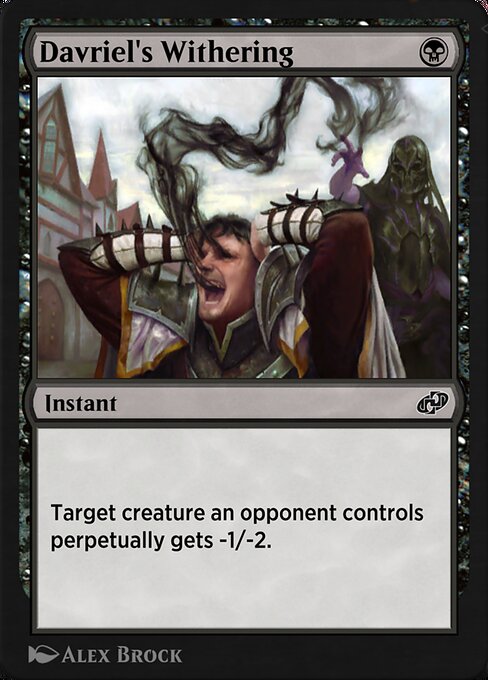I play Historic regularly, albeit not with remarkable success. My deck of choice—mono-Black Vampires, which sometimes splashes Green for Collected Company—is tier two on its brightest day. But I’ve crashed it into Brainstorm piles, Muxus, Goblin Grandee decks, and sacrifice engines enough to know the format well enough.
Or I did, until Wizards announced Jumpstart: Historic Horizons on July 26th. The set was presented as bringing close to 800 cards to Historic—which represents almost 1/6th of the current cards legal in the format. It is also a revision of last year’s popular Jumpstart that divorces itself from paper Magic through digital-only mechanics and cards. This has been controversial, but so is almost everything Wizards announces. But previous iterations of Magic games, aside from Shandalar, have stuck closely to what is possible and printable in paper Magic. JHH is something unique—a way to use the platform Arena is built on in ways that Wizards can’t replicate in paper.
At a basic level, Jumpstart: Historic Horizons offers Historic three innovations along with hundreds of new-to-Arena cards: randomization, conjuration, and legacy-light gameplay in “Perpetually.”

The randomized portion of Historic Horizons, as represented by Seek and cards like Davriel, Soul Broker is straightforward: it’s letting the operating system tackle what would be unfeasible or time-consuming in physical Magic. Pulling out a subset of your deck, shuffling that, then returning the subdeck to your deck and shuffling that would make Sensei’s Divining Top wars look like a mono-red mirror match.
They’re an interesting mix: Davriel, for example, could easily be played in paper with an Offers/Conditions rules card and a d8—I wouldn’t be surprised to see him get a Secret Lair at some point. Cards like Pool of Vigorous Growth would need a dedicated website just to calculate possibilities. Faceless Agent would also be obnoxious, but I really see it more as a way to fetch your single win condition in a control deck more than a tribal enabler.
It’s curious, if Wizards truly wants to make Historic closer to Modern, that we don’t have fetchlands. The main argument against reprinting fetches is that they slow down games through repeated shuffling, which Arena would take care of. It may be that Wizards wants to stay away from Historic becoming a hodgepodge of perfect mana control decks; but if that’s the case, it’s strange that they printed Brainstorm into the format in the first place.

“Conjure” is just a digital-facilitated form of token creation. While it’s wild to be able to play Tropical Island in Historic, Shoreline Scout is barely playable—I doubt a one-drop that requires you to exile a card from your hand is worth conjuring up a true dual land. Overall, Wizards seemed to err on the conservative side for Conjure, which is respectable.
Conjure could theoretically be playable in paper through in-pack token cards like the Magic-backed double-faced stand-in cards, but would be best relegated to a Commander or draft innovation printing. It’s difficult enough to explain token creation to the newest of players, and adding a form of spell token would only exacerbate that. That said, I wouldn’t be surprised to see Conjure show up in a limited setting at some point—Wizards tested the waters with Bone Rattler in Convention Mystery Boosters, and it would be easy to print a Commander deck with Conjure whose token cards were representations of the Conjured spell/creature.
Perpetually, as a form of temporary errata, is the most interesting aspect of Jumpstart: Historic Horizons—again, only possible with digital technology, or only possible in large numbers with digital tracking. Perpetual state changes were first tested out in a surprising form a full decade ago in Skullbriar, the Walking Grave. Of course, the Golgari Commander was only a single card, and the tracking issues were pretty minimal with Skullbriar, but it was still a test case for lasting stat changes.

I refer to perpetually as “legacy-light”—compared to most forms of legacy games, Magic’s “perpetual” is actually very ephemeral, only lasting through the current game. At one point, Unglued 2 was going to have scratch-off cards that would only be usable a set number of times and cards that would be ripped up upon use, similar to Chaos Orb. Most legacy games involve mechanics like this—permanent or semi-permanent changes to game pieces through destruction or overwriting.
Magic can’t fully represent permanent change in paper, as tournaments where you physically destroyed your opponents’ cards would devolve into brawls within a round, but it would be possible in Arena, albeit potentially problematic. Imagine Surgical Extraction that removed a card from the opponent’s collection and you see the issue—particularly in a program that’s stingy with the wild cards to begin with. Instead, we have eighteen “perpetually” cards that last through the current game, most of which come off as Jumpstart Limited specific.
I don’t expect most of these to make the crossover to constructed Historic, but Freyalise, Skyshroud Partisan, Managorger Phoenix, Static Discharge, and Davriel’s Withering seem possible. Static Discharge is Pyrophobia that plays well with Izzet decks and Davriel’s Withering is Disfigure that can permanently neutralize troubling cards—Lurrus and its targets, Skyclave Shade, Scavenging Ooze, Cauldron Familiar, etc.

Aside from these innovations, JHH brings new cards to Historic. While a fair number of the set’s 787 cards were already present on the platform, others are brand new to the platform and range from Limited-only also-rans (Ainok Bond-Kin, Eyekite, Riparian Tiger) to casual all-stars (Thunderbreak Regent, Parallel Lives, Slivers) to tournament staples that may launch old decks into contention (Master of the Pearl Trident, Cordial Vampire, Seasoned Pyromancer). The more innocuous cards from Modern Horizons and Modern Horizons 2 are included—Breathless Knight, Archmage’s Charm, various Arcbound creatures—and a selection of intriguing build-arounds or tribal enablers like Soulherder, Undead Augur, Svyelun of Sea and Sky, Thalia’s Lieutenant, the Slivers mentioned above.

Wizards is also determined to shake Historic up, offering Dragon’s Rage Channeler, Hardened Scales, and Ponder as a Brainstorm Replacement. Izzet Phoenix will continue dominating, and I expect Hardened Scales to become a new powerhouse as it was in Standard and Pioneer.
It’s an intriguing way to give cards that were calibrated for Modern Horizons Limited but not designed to make it into Modern a second life. Lazotep Chancellor isn’t good enough for Modern, but is it a possible engine in Historic? Probably not, but why not inject it into the format nonetheless? Tireless Provisioner is a revision of Tireless Tracker that plays well with Eldraine’s Food, so why not see what it can do in a slightly slower environment? The massive influx of cards seems overwhelming; but since most are forgotten Limited cards or cards that already exist on Arena, it doesn’t really increase the size of the format beyond what a few Historic Anthology dumps would do.
More than anything, I’m pleased by Wizards’ willingness to experiment. For one thing, it suggests Arena will be around for years to come and won’t go the way of previous, now-unsupported ways to play digital Magic. Wizards continues to actively curate Historic as a digital complement to Modern, and they clearly keep the pitfalls of Extended—stagnant archetypes and sporadic rotation—in mind as they tweak the format. Without periodic shakeups, Historic would rapidly stagnate into a metagame based on the best cards and archetypes from Arena’s brief tenure, and so Wizards lobs the Mystical Archives cards and Jumpstart in along with Remastered blocks and Anthologies to keep it fresh. There are the usual grumbles and stumbles, but Jumpstart: Historic Horizons proves that Historic is a laboratory for Wizards, not just another dueling ground.
A lifelong resident of the Carolinas and a graduate of the University of North Carolina, Rob has played Magic since he picked a Darkling Stalker up off the soccer field at summer camp. He works for nonprofits as an educational strategies developer and, in his off-hours, enjoys writing fiction, playing games, and exploring new beers.

